September 17 - October 7, 2023: Issue 599
Dry Warm Spring Forecast: Put In Drought Tolerant Native Plants + Spring School Holiday Spring Gardening Ideas For Youngsters Because They Like 'Growing Stuff' Too
He chose well as all but one of the plants, a Ned Kelly Grevillea, have not only survived they are now thriving, as shown above.
The plant label that came with the Ned Kelly stated 'Plant in free-draining soil in full sun or part shade; more sunshine means more flowers'. Although this advice would indicate it would not do well on the bank under the trees in clay soil, the promise of ''A medium-sized bushy shrub with stiff, heavily divided, fern-like foliage and orange-red flowers which are displayed throughout most of the year. Loved by honey eaters flocking to feed on the flowers at dusk and dawn. Ideal for use as a screening plant or feature shrub. Long season of colour'' seemed worth a go.
planting day June 2021
September 2023 - Ned has left the bank.
There was just too little sun and the soil was unsuitable for any bushranger to take over the front bank.
Given the BoM has forecast a warm dry Spring and that may well be followed by very hot dry Summer, it's worth heeding the descriptions on native plants, which are clearly going to do better in Australian conditions, and also look around your neighbourhood to see what other gardeners have had success with.
Just around the corner from us 'Di' has a thriving native plant garden. Di moved here just 9 years ago because she loves the beauty of the area and the native plants that will do well here. Her garden is a mix of local and species, such as kangaroo paw, and although only planted out since moving to Pittwater, it already looks well established and masses of blooms erupt early each Spring and persist through other seasons as well.
Di kindly let us photograph these and advised that she too has had some that failed but if you love what it may bring to your garden, wildlife, along with those glorious scents of pure honey, it's worth having a go. Her successes run below, along with some taken in past research into what will work where. Council also have a webpage that advises what will suit restoring habitat in your garden in Pittwater.
Having completed one side of the garden the owners of the 'garden around the corner' have now started on the other, installing garden rocks to begins with.
Although many native species of plants will do well in dry conditions, they still need TLC, a good watering when it's been too dry, and a good feed.
The following tips have been collected as a guide.
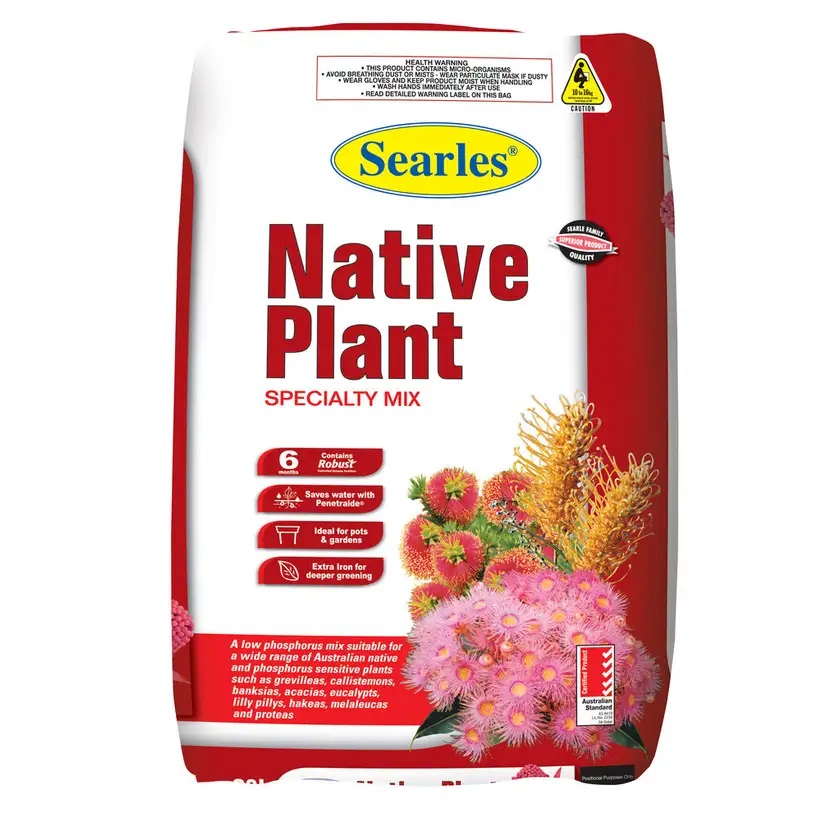
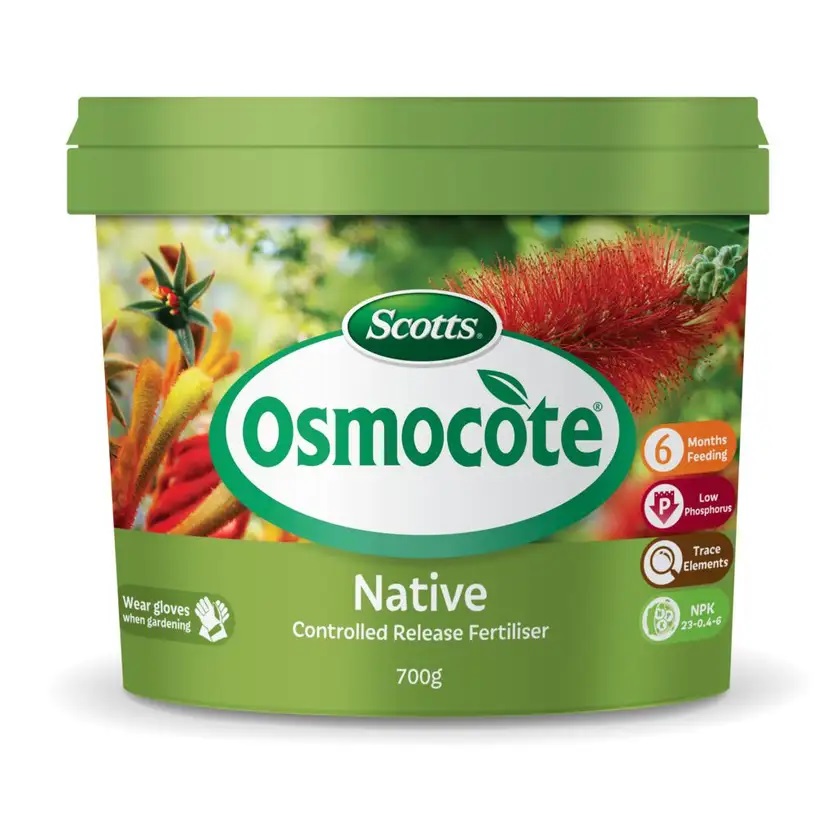
Some of the Best Native Plants for Native Bees
You want to attract the bees too - bees, along with birds and other insects, are what is termed 'beneficial' for the garden.
Brachyscome: These long-flowering ground covers are popular with stingless bees.
Callistemon – Bottlebrush: These nectar-rich flowers also attract native bees.
Ceratopetalum gummiferum ‘Alberys Red’ - Christmas Bush: This large shrub, with dense cream flowers in springtime, attracts many native bees.
Eucalyptus: Gum blossom is often covered with clouds of native bees – local varieties Spotted gum and Angophoras are very attractive to native bees
Grevilleas: Many Grevilleas such as Grevillea Moonlight provide good nectar for bees.
Hibbertia scandens: The Common Teddy Bear Bee and the Common Blue Banded Bee love buzzing the flowers of Hibbertia scandens.
Leptospermum polygalifolium - Lemon Scented Tea Tree: Leptospermum species are in the ‘top ten’ list in Native Bees of the Sydney Region – A Field Guide.
Scaevola humilis - Fan Flower: Many small native bees and leafcutters visit these flowers.
Senna clavigera: The Common Teddy Bear Bee, the Common Blue Banded Bee and the Emerald Homalictus buzz the flowers of this bush. Leafcutters also clip pieces of the leaves for their nests. Long flowering period.
Thryptomene saxicola FC Payne: This graceful winter flowering shrub attracts stingless bees and other native bees.
Westringia fruticosa - Coast Rosemary: Westringia is also in the ‘top ten’ list in Native Bees of the Sydney Region – A Field Guide. It flowers over a long period and is tough and reliable.
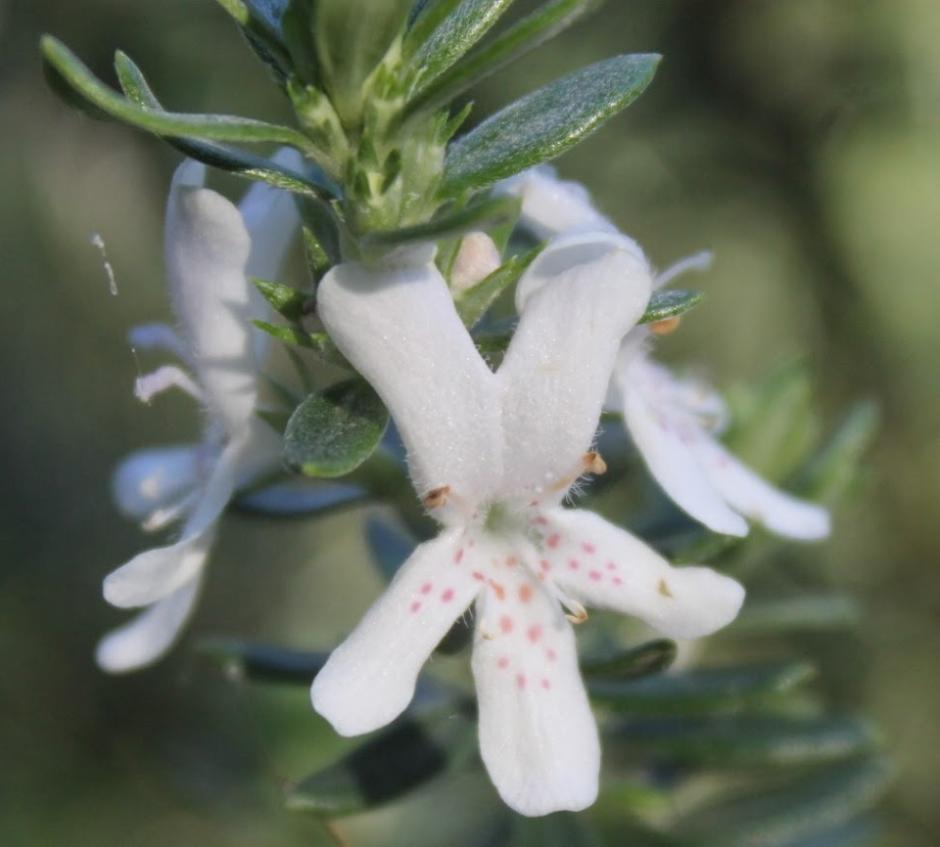
A few more tips to help the bees along in your garden with just few simple steps:
- Choose pollinator-friendly species, such as thistles, lavender and oregano, for your garden.
- Ensure there is always something in flower, from early Spring to late Autumn and onwards into Winter.
- Mow the lawn less often, even just in a small patch, as this allows dandelions, clovers and other plants to flower. Autumn is a great time to ease off on the mowing as the grass won't be growing as quickly as it does in mid-Summer.
- Avoid pesticides. Pollinators can ingest these poisons when they feed from flowers.
- Cover as much of your garden as possible in flowery borders and natural lawns, rather than paving and decking.
- Pots, hanging baskets and window boxes can further supplement the food supply.
Callistemon or bottlebrushes are native to our area and will thrive and attract birds to your garden as well as provide brilliant burst of colour
Heath-leaved Banksia, Banksia ericifolia, and Swamp Banksia, Banksia robur, both thrive in our area. What's more these trees have year round flowers with new ones growing as the old ones are finsihing. Birds, insects and possums love them.
Another native beauty from Di's garden - thanks Di!
Some Spring School Holidays DIY Fun: A Littlies Salad Garden + Fairy Arbour
There's no reason to leave the youngsters out of all this - studies have shown they will enjoy food they've grown more and want to get involved in looking after a native plant - habitat restored garden if they're pat of the plan from the get-go. A great reason to let them do the watering as it gets warmer, if only for the 'playing under the hose' it brings!
If your youngsters love to play in the dirt or love to help out in the kitchen making all kinds of good things to eat then their very own salad garden may appeal.
As we head into Spring and Summer Salads will soon be what we all want to eat, and younger people love raw carrots and sticks of celery or little tomatoes (cherry tomatoes) or lettuces that can continue to provide leaves over the whole of these seasons simply by picking the outer leaves and allowing the others to continue to grow. Cucumbers are great to eat and can be made into a yoghurt raita too – great for carrot and celery stick dipping.
There’s beetroot for burgers and onions to go with sausage sandwiches, or garlic for salad dressings – everything they like to eat they can grow and have fun and gain a sense of great achievement bringing to the table the best food in the neighbourhood!
Do your children like herbs? How about growing some parsley or thyme, rosemary and basil. These scrumptious aromatics can add yumminess to roast chicken stuffing or a basil based pesto for pasta.
Or even consider just filling an old stocking with sand and grass seeds so they can grow a Mr or Mrs potato head, or use the leftover egg shell after boiled eggs and insert some cotton wool. You don't have to just put grass seeds in, trying planting something they may not only like to trim (haircut!) but also eat - chives for instance. Children young and older LOVE seeing something grow.
Littlies Salad Garden
To begin some preparations and decisions need to be made.
1. Garden Plot or Garden in Pots?
If you have a lot of possums and bandicoots in your yards, or limited space, you may want to think about planting your salad garden in a series of pots that can be covered over at night so these little munchers don’t have the pick of all growing before it’s big enough to eat. Small just sprouting plants taste great to these local furry residents. We grow our herbs in pots and just put a big bucket over them at dusk as we have found our resident possums just love our parsley.
If you think a garden plot will be alright for what you want to do then choose a spot in the yard where it will get enough sunlight to promote good growth but not so much that it will be too hot for your salad plants once Summer’s sun rises.
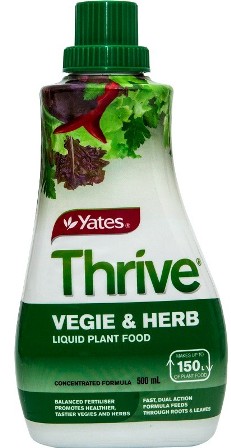 2. Soil Preparation
2. Soil Preparation
Once you have decided on pots or a plot you need to make sure the soil itself will be healthy enough to feed all those growing youngster plants. A good compost bin works well here to mix in with the dirt and also some fertilisers – mum or dad or grandma and grandpa will have to do this bit for you – gloves and a mask are required. It’s also a good idea to let this new mixture sit in the soil for a day or two, watering and turning it over a few times prior to planting any seedlings or seeds. That way tender roots won’t come in contact with fertilisers that may burn them.
Thrive Veggie & Herb Liquid Fertilizer - $15.00 - 500ml - makes up to 150 litres
You can also apply pellets of plant boosting food to pots, if that is what you have chosen to do. An adult to help is a good idea there too – you don’t want to put in too much and you need to work out what fertilisers will work best for what kinds of salad ingredients you want to grow.
You can probably help with the mulching – mulching is a layer over the top of the soil, in either some hay or some bark, that will protect the soil from blowing, feed it as well as it changes into compost itself, and keep water you spray, when watering your garden, in the soil a lot longer – very beneficial to your garden!
3. What to plant and How to plant it
Once you have prepared your soil make a list of what you want to grow and perhaps do a diagram as to how you will plant out your salad garden.
Things that grow tall and on a trellis or supported by stakes, such as cherry tomatoes, cucumbers and capsicums, would look great at the back of the garden, where they will still get lots of sun.
Smaller closer to the ground plants, like the herbs, will make an attractive and easy to reach border.
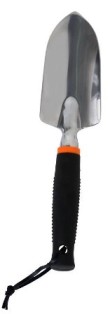 Fiskars Garden Hand Trowel - on sale $10.96 - Ergonomic handle. Lightweight aluminium.
Fiskars Garden Hand Trowel - on sale $10.96 - Ergonomic handle. Lightweight aluminium.
Lettuces in a row will grow best in the center of your plot, as will celery, and under the ground root vegetables with light green fluffy tops on either side of these will benefit from the sun overhead, while beetroots could go towards the back too, just before your capsicum/cucumber wall of green eatables.
How about some baby carrots? Kids love carrots and if they're growing some sized just for them you may find them out there, sitting in the dirt, munching away.
Corn would grow best in a row by itself too - and could be used as a bit of a windbreak as it grows if you have a yard that gets a strong sea breeze like those that run in November.
A pot with some cherry tomatoes (so they don't spread everywhere else), a row of herbs, some cucumbers, maybe even a capsicum and they're away, and then waiting for the planting out, the watering, and checking on them night and morning to see if they're growing ok.
If you make your list, then do a drawing with your youngster, you will not only do what’s best for ensuring you get a good crop, you will also have a garden plot that looks good – or ‘good enough to eat’ if you will pardon the pun.
4. How to look after
Once everything is planted you need to keep an eye on your babies. Watering them well in the morning, and if it has been a hot day, an hour before dusk too, will stop them from wilting or not growing – plants get very thirsty too!
Aim the hose towards the roots of the plant, not their leaves so much as water sitting on leaves under sun can scorch them – the roots is where they drink anyway – they don’t need too much elsewhere unless it has been dusty and you want to clean dirt off the leaves so they can get more sunlight to help them grow.
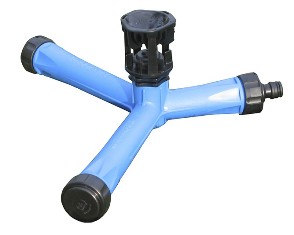
When and as they begin to grow, some plants will need some help standing up – this is where staking for tomato plants or a simple trellis or frame to help vine like plants such as capsicum and cucumbers stand or grow upright will need to be done.
If you have chosen pots to grow your salad garden in, you can still do this, just with smaller versions.
The other thing you need to do as your plants grow is keep and eye on their leaves – this is where the health of your salad vegetables shows – discolouration means something is growing wrong and you may need adjust their food. Perhaps too much fertiliser has been added by mistake and something else is needed to balance this out – or they may not be getting enough food from the soil, and something else needs to be added.
Wobble Tee Lawn Sprinkler - on sale $42.00 - Waters up to 15m diameter. Water efficient design.
The other part about leaves is when they have gone brown and finished to gently pluck away those leaves. That stops the plant sending everything needed to keep growing a leaf that has finished to that part of it and allows the plant to send, instead, all that good stuff to the parts still growing.
As your garden grows there may be a few weeds that pop up here and there, blown by the wind as seeds into this wonderful soil – these too will needed to be pulled out so they don’t take the food your salad vegetables need. It’s a good idea to pull these out soon after you have done the watering – the soil will be soft and it will make it easier to get the whole weed, roots and all, and that will stop them growing back.
These weeds and discarded leaves can go into your compost bin to become more food for future gardens!
5. The feast!
After around six weeks the first of your salad and barbecue and pasta ingredients will be ready to pick. It’s Yummo Time!
You may even be able to put a whole meal together – some pesto spaghetti, with a nice salad on the side, or some mushrooms stuffed with your own herb seasoning.
As we have suggested salad vegetables and herbs that will keep producing throughout these two seasons, as long as you pick the outer leaves of your lettuces, or the rip tomatoes, you should be able to bring something to the table until the end of Summer. We hope you have great fun with your very own Salad Garden and learn a little bit about all the nice things you like to eat this Spring and Summer. Bon Appetite!
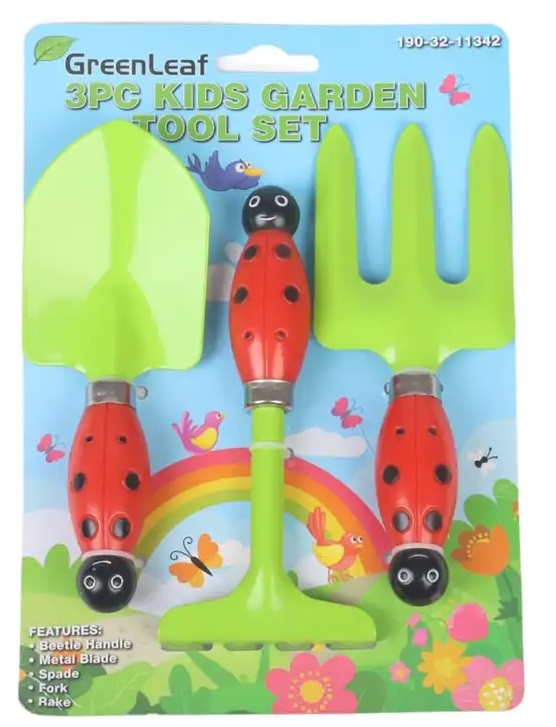
Greenleaf Kids Garden Tool Set Beetle - 3 Piece: $9.00 ; Metal blade, Beetle handle. Includes a spade, a fork, and a rake.
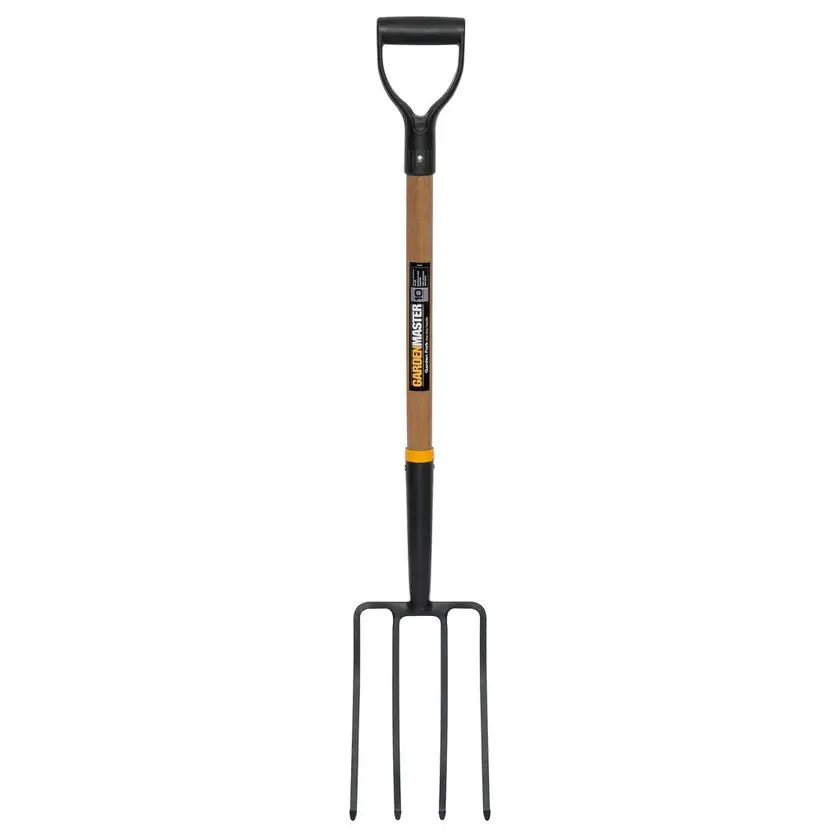
Gardenmaster Plastic D Handle Fork: $39.20 - Short dee grip handle for close work. Reinforced neck assembly. 100% tempered steel blade. Strong hardwood handle. 10 year guarantee
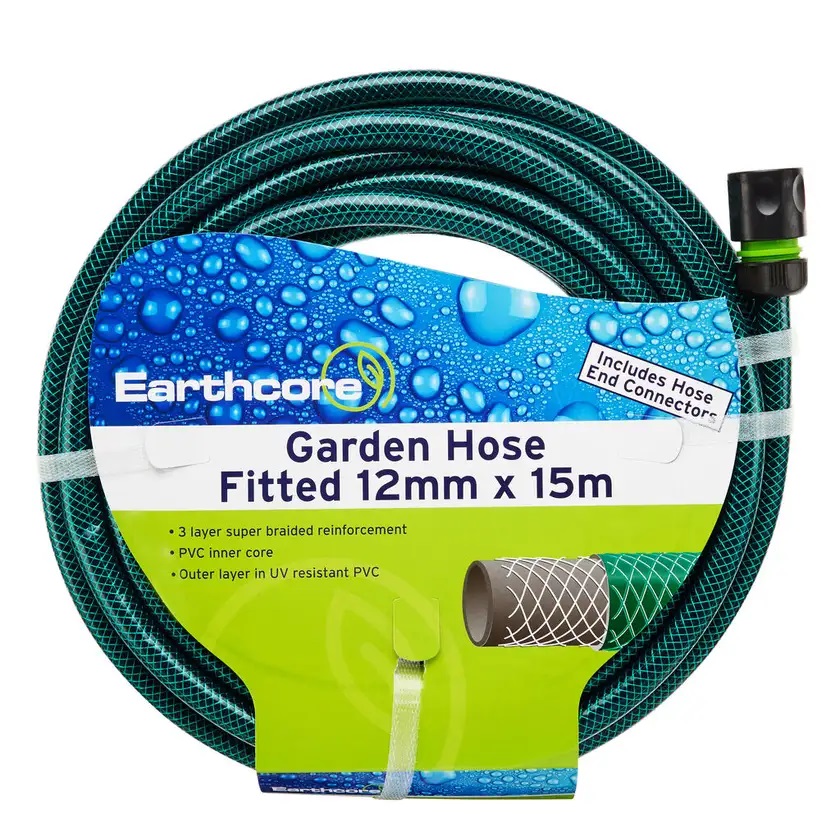
Earthcore Garden Hose Fitted: FROM $20.00
Fairy Garden
If your children take their toys out into the garden to run them around in the dirt, making a few 'fairies' from ice cream sticks and bits of cloth and making a home for them amongst the native plants may be of interest this school holidays. After all, Cuddlepie and Snugglepot and the Banksia men wasn't all pure whimsy, our native plants and their flowers definitely have an essence and lend themselves to creating 'flower dolls' and fairies - why not make some little ones to put in among the plants or into the bole of a tree to keep them company while they're growing and getting ready to flower?
Details in miniature could easily be the theme for creating a fairy arbour or dinosaur range for youngsters in your own garden. Dedicating one corner, or the reclaimed space created by installing your own retaining wall, for a little magic, will provide enjoyment in the creation of this arbour, teach your youngsters about plants and soil and ‘how a garden grows’. This is where children can be really creative too; making fairy houses, paths and small dance circles, or, if you have boys who want a dinosaur garden – small caves, wide plains in miniature or even a jungle corner will create their own outdoors space and allow their imagination to dream up fairy stories or dino adventures!
A pond or birdbath is always a great idea for these areas too – many a fairy loves the soothing tinkling sound of water, and a water feature will also attract birds to this place in your garden – for flower nectar or to feed on Summer insects.
You may want to consider installing a rainwater tank too – a long hot Summer is forecast and having reserves of this resource will benefit you and your garden.
Turning a corner of your yard into a Native plants garden, in the choice of plants from groundcover to shrubs, will establish bursts of colour year round and contrasts in foliage, reduce fertiliser used and water consumption, reduce weeds, are low maintenance (more time for child’s play!), produce habitat and food for native animals and look great.
Most Native Plant Garden landscape designers suggest allowing for three layers to attract native fauna and give a good scale look – groundcover, shrubs and canopy provided by trees. Planting in lines or keeping it too formal geometrically is not what you find in the bush either – so planting at irregular intervals will bring a bush garden into your own home.
Before you commence planting it is a good idea to consider a few key points: the height and spread of plants at maturity, how you want the garden to look (layout), and what species will thrive best in your soil. Although our native plants are adapted best to this climate and soil types, they too do better with being mulched and fed.
Creating a fairy garden or dinosaur range is a great way to use broken pots, old birdhouses – discarded pebbles can be made into little paths that weave through undergrowth, make small fairy furniture from twigs, arches from great natives such as clematis that lend themselves to being 'sculpted' by little hands and will recover if they get tugged a little too much in the making.
For all your gardening needs we suggest you talk to the friendly trained staff at Johnson Brothers stores at Avalon, Mona Vale and Narrabeen where a wide range of everything you need at a family friendly price is always available and there are always trained friendly staff on hand to help you with what will work where in your garden.

Johnson Brothers Mitre 10: Serving Our Community Since 1955
The Independent Hardware Group has awarded Johnson Bros Mona Vale the best in state at the IHG state awards and heads to the national finals on the Gold Coast in February 2022.
Congratulations to the store in Avalon Beach as well, which won best in village.
Johnson Brothers say; ''Thank you to all of our amazing staff and customers for being awesome!''
IHG is Australia’s largest home improvement wholesaler supplying more than 1,500 stores nationwide. These stores cater to a broad range of Trade and DIY customers and range from large format warehouses to convenience operations and Trade centres, as well as frame and truss sites in two States.
Under the IHG network, there is a clear mandate to support the growth of Independents within the hardware sector in Australia by helping them to be ‘The Best Store in Town’.
The culture of IHG is built on being a low cost and transparent business partner to members, with an unwavering commitment to protect and grow a sustainable independent hardware sector for the long term.
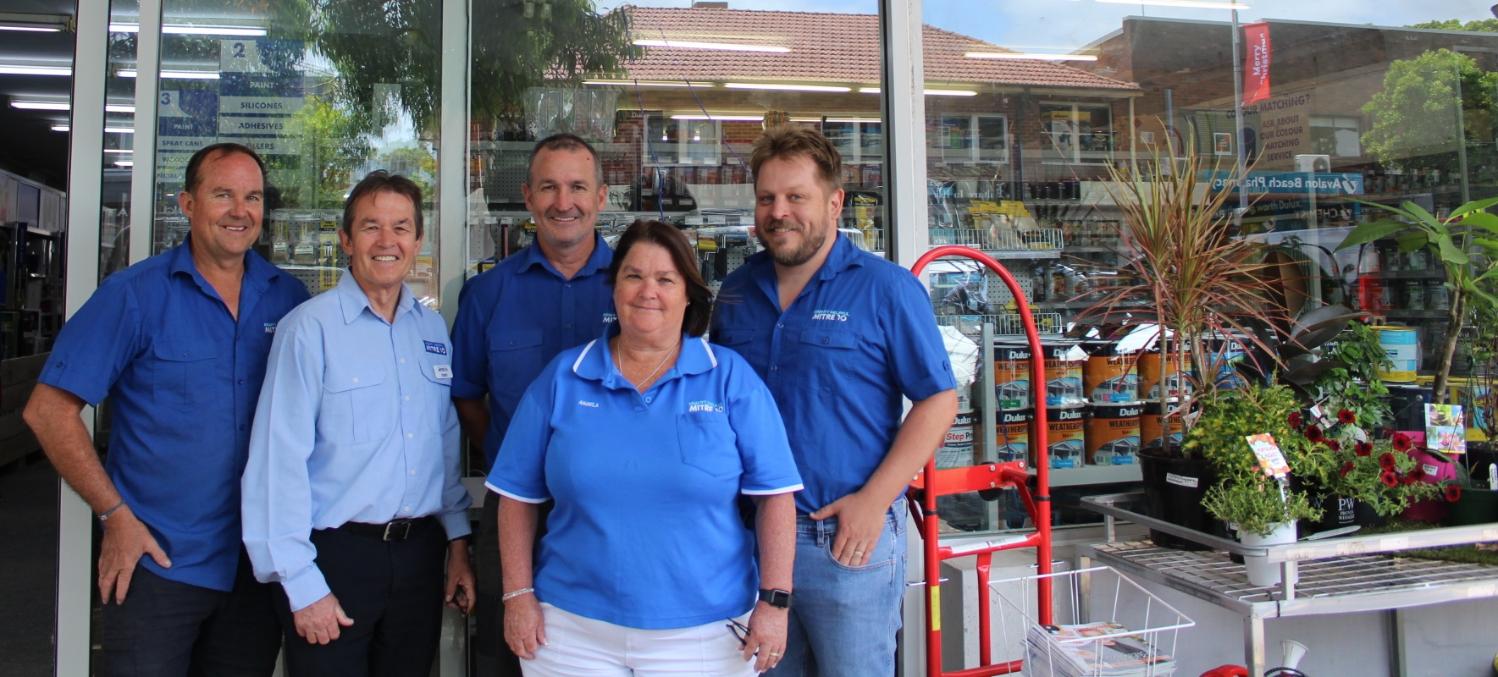
Johnson Brothers Mitre 10 Trade Centre at Mona Vale - everything you need under one roof.
JBH Design Centre
JBH Design Centre is a tool for builders and DIY'ers to assist in the fit out of houses. It has displays of kitchens, Bathrooms, Doors and Storage as well as knowledgeable staff to assist in making house fit out painless.
Visit: http://jbhdc.com.au/
On Facebook: https://www.facebook.com/design.centre.jbh/

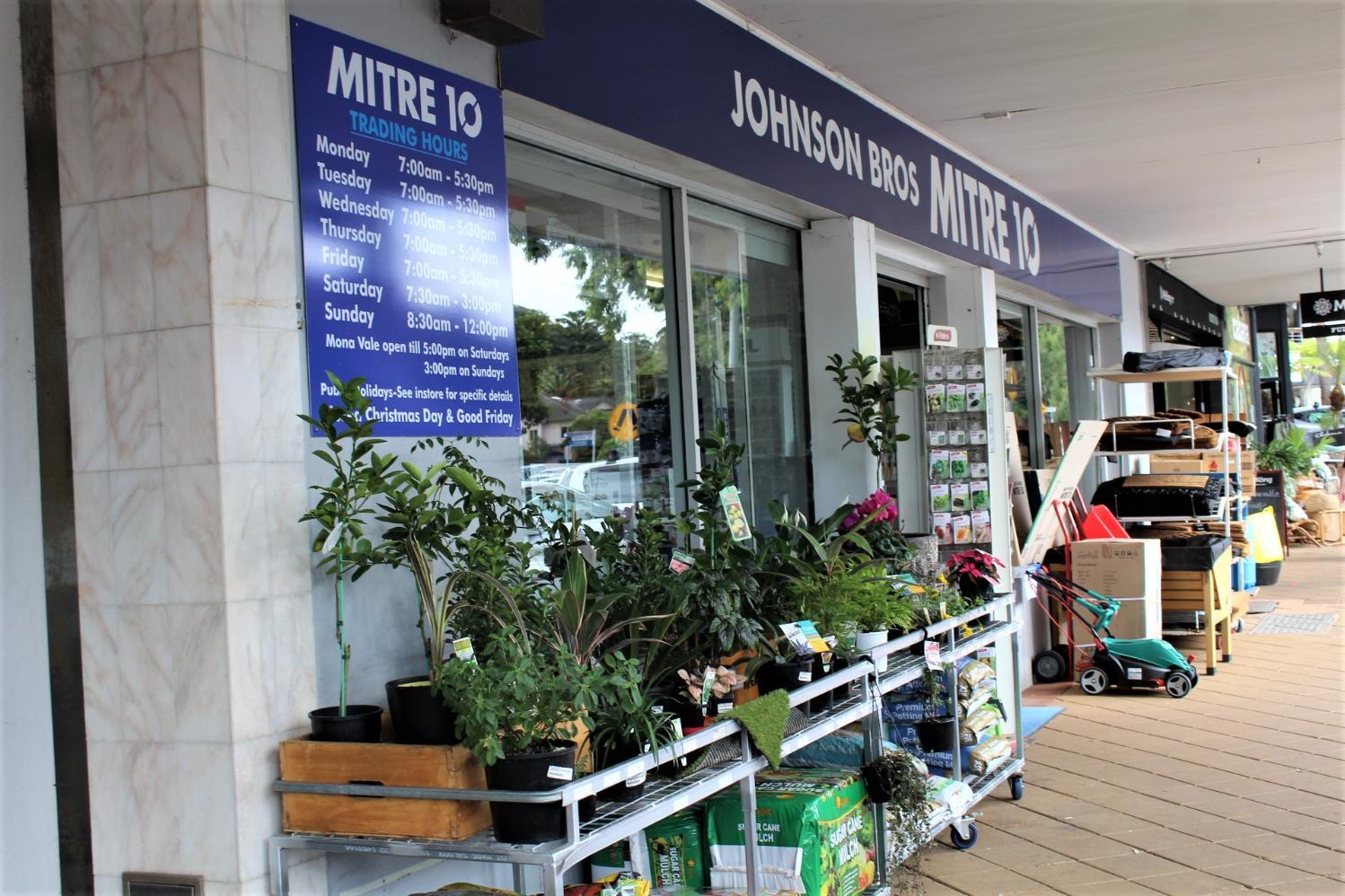


Johnson Brothers Mitre 10 New Store
73 Bassett Street
Mona Vale - Online Store: Jbhmv.Com.Au

Products advice is available from the trained friendly staff at Narrabeen, Mona Vale and Avalon Johnson Brothers Mitre 10.
Click on logo to visit Johnson Brothers Mitre 10 website
Johnson Bros Mitre 10 - Avalon (02) 9918 3315
Johnson Bros Mitre 10 - Mona Vale (02) 9999 3340
JBH Timber & Building Supplies (02) 9999 0333
JBH Fencing & Landscape Supplies (02) 9970 6333
www.johnsonbros.com.au Online store: jbhmv.com.au
Previous DIY Pages:
Decking Timbers Caring For Your Deck Decking Finishes Privacy Screens I Privacy Screens II Privacy Screening Hardwoods Autumn Paths and Lawns Insulation Batts Plasterboard Ventilation - Edmond's Ecofan Blackboards for Children and Home Spring Lawn Care Shade Sails & Watering Basic DIY Tools DIY Tools - Power Drills Recycle Your Trampoline into An Air Bed How to Build Your Own Backyard Cricket Pitch Christmas Lights Displays around House and Garden Summer Mildew - Refresh, Renew How to Fix Things That Drip and Bump in the Night Time To Plant Winter Vegetables in a Raised Garden Beds Layout Organsing Your Tool Shed Make Your Own Weathervane Installing A Garden Watering System Decking Oils How To Make Garden Compost How To Winter proof Your Lawn How to create Shabby Chic effect on Timber Furniture How to Build Your Own Raised Garden Bed Growing Your Own Winter Vegies Winter Heating Guide Prepare Your Yard For Winter Eradicating Noxious Weeds From Your Yard How to Fix Furniture Finishes Part I How to Repair Scratches, Dings, and Dents of Furniture Surfaces - Part II Winter Draughts Fix Classic Wooden Tool Carrier Spring Garden Checklist Part I Install Your Own Skylight Retaining Walls for Saving Soil and New Spring Garden Beds Summer Salad Garden Native Plant Garden for A Fairy Arbour Renewing Short Flight of Exterior Stairs Deck Maintenance DIY Summer Tasks You Can Do In Time to Get to the Beach Garden Ponds for Attracting Birdlife, Dragonflies and for the Soothing Sounds of Water Salt Air: Maintenance and Protection Creating an Outdoor Dining Arbour, Gazebo or Patio - Part I Creating an Outdor Dining Arbour, Gazebo or Patio Part II Autumn Garden Tasks Autumn DIY Jobs: Waterproof Your Home Checklist Dealing With Dampness Inside the Home Fixing Your Fence Repairing and Replacing Damaged Decking boards DIY Toy Box and Snow Globes: School Holidays Fun - Winter 2015 DIY Wooden Toy Cars and Perfect Painted Flowerpots: School Holiday Fun - Winter 2015 Shoring Up an Under House Earth Bank – Installing a Basic Retaining Wall DIY One Shelf Sideboard Early Spring 2015 Garden Care Salad Garden For Children Keeping Your Garden and Home Cool in Hot Weather Classic Beach Garden and Camping Chairs 3 Portable Versions Anyone Can Make DIY Outdoor Furniture Mark I: Park Benches for Your Garden Make Your Own Scooter or Skateboard: Summer 2016 Fun How to Install a Solid Core Door and Door Furniture Summer Garden Jobs: Pruning A Hedge How to Make A Swing Chair - With A Frame for Garden Setting Garden Jobs for March to Make A Beautiful and Healthy Spring Keeping Outdoor Nooks Warm During Cooler Months Children’s Step Stool with Storage Stop Winter Rain Lawn Loss and Soil Erosion on Slopes DIY Garden Shed: Part 1 of 4 - Base DIY Garden Shed: Part 2 - Framing Walls DIY Garden Shed: Part 2b - Gable Roof Framing Garden Shed Part 3: Roof Installation DIY Garden Shed: Weather- boards - Door And Window Installation And Paint Finish DIY Coffee Table With Chessboard Inlay Spring Gardening: Feeding Your Soil And Plants - What Works For Each Plant DIY Sandstone Flagging Parking Area - Platform DIY Pre-Summer Checklist For A Safe Home Summer Spruce Up: Interior Paint Tips and Three easy steps to rejuvenate your timber deck The Perfect BBQ Garden Setting DIY Water Wise Garden DIY Side Gates DIY Storm Preparation And Home Protection One To Two Day DIY Weekend Spruce Ups Vegepods For Autumn Planting + Easy To Make Lego Table Or Student Desk That Can Be Dismantled + Johnson Brothers Mitre 10 Online Store Johnson Brothers Mitre 10 Great New Mona Vale Store: Still In Bassett Street - number 73 Johnson Brothers Mitre 10 New Mona Vale Store: The Greenlife Garden Centre Go Outside And Play: Creating Garden Spaces To Connect Children With Nature DIY Plasterboard Repair DIY Dolls House Or Garage Or Boatshed DIY Child's Waggon - or use as a large planter mover DIY Bathroom Refresh: Zing For Spring Tips for Growing a Native Garden FireCrunch, Australian Developed Fire-proof, Sustainable, Durable and Reliable Building Board Now Available at Johnson Bros. at Mona Vale and Narrabeen School Holidays DIY Ideas for Children: Little Vegetables Garden, Swing, Windchimes Bushfire Season Preparation 2017: Home and Outdoor Areas Johnson Brothers Mitre 10 Trade Centre at Mona Vale + Issue No 1 of Mitre 10’s inSITE Magazine for Tradies and Handymen Preparing Al Fresco Areas for Christmas Get-Togethers and Summer Visitors Summer De-bug; Mosquitoes, flies, cockroaches and ants - how to keep the outdoors insects where they belong DIY Summer Projects: Install A Fountain Or Water Feature Late Summer and Early Autumn Projects: A Shed For All Storage Solutions + Garden Tasks + Keeping Our Waterways Clean Autumn Plantings for Winter Harvests 2018 Paintback Collection Event: Johnson Bros Mitre 10 Mona Vale Saturday, April 7 Reducing Ticks in Your Garden: Garden care, Plants that Repel, What to Wear Outdoors Attracting Insectivore Birds to Your Garden: DIY Natural Tick Control Mother's Day 2018: DIY Rose Garden Winter Mould & Mildew Inside Your home: How to Keep Air and Surfaces Healthier DIY Traditional Rocking Horse Johnson Brothers Trade Day 2018 DIY Mushrooms and Vege Kits: School Holidays Fun Winter 2018 for Curious Kids Woodworking Projects for Beginners: School Holidays Fun Winter 2018 - Simple Storage Box + Wood Tool Box Spring Garden Prep: Soil Care Spring into Spring + JBH August 2018 Trifecta DIY Backyard Doggie Paradise Garden Care for Heavy Rain Days + Non-Toxic Snail and Slug Debug Ideas Garden Design and Plant Management to Minimise Tick Attacks and Infestations - insights from an essay by Bill Conroy BSc. (Agr) (Syd) + a Tribute to Wilfred Lawrence Conroy CBE by Keith Jackson, PNG and others Make Your Own BBQ Kitchen Garden: Gifts That Grow Past That Giving Day Christmas Lights 2018: Light Up the Night How to Keep Your House Cool During a Heatwave Without Using an Air-Conditioner Mid-Summer Garden Care 2018 Winners Of National Hardware Store Of The Year - Johnson Bros Mitre 10 Mona Vale! + End Of Summer Garden To Do List DIY Fruits of Your Garden: Growing Figs Fruits Of Your Garden: Growing Passionfruit - Autumn Is Also The Time To Plant Strawberries For Spring How To Water Your Plants When Away On Holidays + Some April 2019 School Holidays Fun For Outdoors; A Skateboard Swing Or Indoors; Grow Or Make Pot Plant People Dealing With Autumn Dampness Inside The Home + Mums Day Gifts For 2019 Winter Heating Guide + Get Ready For Winter Specials Keeping Your Garden Dewful During Times Of Water Restrictions and Drought Installing Leaf Stopper Gutter Guard + Trade Day 2019 JBH Mitre 10 Trade Day Guests 2019 An Artfull Garden - for Winter School Holidays 2019 DIY Deck Refurbishment: Turning Wood Into Open Tiled Spaces - Groundworks Father's Day Wish List 2019 + How to Re-stain your Deck timbers and posts for Summer Installing Posts For Decks and Verandahs With Heavier Loads + Installing Membranes For Tiled Decks National Garden Week's 2019 Focus Is On Children(Oct 13-19): Spring School Holiday 2019 Garden Ideas (to get started on) Replacing Balustrades Handrails DIY Tiling Your Verandah: and Choosing Your Simple Or Complex Tile Pattern Reduce Bushfire Risk To Older Homes + Preparing Your Yard For Bushfires Time to Put Up those Christmas Lights and Deck your Gum Trees with rows of Jolly! NSW RFS Bushfire Survival Plan 2020 + Reduce Bushfire Risk To Homes + Johnson Brothers Mitre 10 Great Water Saving Ideas during Level 2 water restrictions + some 'Don't Sweat Summer' Specials The Inaugural Sydney Edible Garden Trail - Learn how to help your garden survive the heat, drought, and water restrictions DIY Flyscreens DIY Privacy Screen In 2 Hours Family Hardware Store Wins Best In Australia Autumn DIY Jobs: Exterior Jobs to Keep Everything Dry and Cosy Inside the Home Autumn Vegepod Garden: Plant Now to Stay Healthy: JBH Response to COVID-19 Restrictions - We're Adapting! Autumn Holidays Projects: Let's Go Fly A Kite + Some handy Painting Tips for Interiors and Sprucing up that Outside Deck - Easter Hours 2020 Pittwater's Noxious Weeds: A Great Time To Get Outdoors and Pull Them Out and Replace With Native Plants Blooming Lovely: Late Autumn Planting For Gardens Full Of Colour, Cheer + Great Food For The Table Dealing With Dampness Inside The Home - June 2020 DIY A Job For Life: Apprentice Carpenter + Commencement Tool List Winter School Holidays 2020: Easy To Do Garden Mosaic Pavers Little Hands Can Create + Home DIYer: Simple Concrete Slab DIY - A Job For Life: Landscape Gardener Apprenticeship DIY Fathers' Day ideas for 2020 + August Garden Jobs DIY Job for Life: Plumber's Apprenticeship Early Spring Garden Care Spring 2020 + Salad Garden For Children A Job For Life: Certificate III In Electrotechnology - From Apprentice To A Business Owner; Jay Turns Up The Voltage On His Career + Spring Garden Specials - seedlings time! Spring is here and wattles are out in bloom: a love letter to our iconic flowers Perfect Tomatoes, Capsicums and Spring Onions - Summer Salad Staples + what to plant now BBQ Season: some tips to keep your New or Old BBQ Clean Christmas Lights Time 2020: Deck Your Home With Rows Of Jolly! Johnson Brothers Avalon Store Renovations & Mona Vale Store: Everything You Need This Summer In Stock How To Keep Your Home Cool During A Heatwave Dealing With Dampness Inside The Home: The Wet Summer Of 2020/2021 +Nothing By Halves, Johnson Bros. Mitre 10, great new video By Community Requests Autumn/February 2021 re-run: Garden Design and Plant Management to Minimise Tick Attacks and Infestations The Bees Knees: what you can plant now to help your garden grow and help the bees Dealing with Storm Events: Flooding inside and around the home - how to Be Prepared Fun Project Ideas for Autumn School Holidays 10 Ways to keep your home warm and save money this Autumn and Winter Mother's Day 2021 Ideas: Grow Her Some Lemons Or Avocadoes Or Get A Pink Step Ladder So She Can Safely Reach The Top Shelf Indoors + JBH Celebrates Upgrade Of Avalon Beach Store These 3 Tips Will Help You Create A Thriving Pollinator-Friendly Garden This Winter 'Generation Restoration' Is The UN's World Environment Day 2021 Theme: How You Can Help Out At Home The Johnson Brothers Trade Day Is Back: Thursday June 17th + How To Build A Nesting Box For Our Local Possums and Birds Winter School Holidays 2021: Fun Projects You Can Do Around The Home - Something For The Young and Even Younger Winter DIY Ideas: Painting A Feature Wall + Outdoor Heating Options For Your Home + Declutter/Organise That Tool Shed Science Week 2021 Food Theme: A Salad Garden For Children Early Spring Chores For Great A Summer Outdoors: Clean and Reseal Your Wooden Deck Area Early Spring Chores For Great A Summer Outdoors: Soil Preparation For Vegetables + Salads + A Few Other Tips To Make Your Garden Ready To Plant Out Spring School Holidays Projects 2021: A Swing Chair and Dolls' House or Toy Garage The Beer Ledge: Done In An Afternoon Projects For The Garden October- November Garden Jobs: Let's Get Busy Planting Out Now + Mow For Your Bros. This Movember Mow For Your Bros. This Movember: Some Lawn Care Tips To Keep Your Grass Greener This Summer - Aerate, Worm Up!, Fertilise, Watering, Mowing Basics Christmas-New Years 2021 Checklists: Preparing The Garden & Home - Entertaining - Gift Ideas For Every Budget DIY Backyard Cricket Pitch DIY Surfboard Rack: Vertical and Horizontal Options Late Summer - Early Autumn Garden Tips: BOM Forecasts Warm Autumn 2022 With Above Average Rainfall Dealing With Dampness Inside The Home March 2022 Maintenance Of Your Home's Outside Areas After Storm Events: Paths, Walls & Windows, Dampness Under The House, Dying Lawns And Plants - The DIY Checklist Fun Project Ideas for Youngsters for Autumn School Holidays: wooden cars, blackboards, bright painted herb pots, grow your own food, make a chessboard Mother's Day 2022: Promise Her An Ever Blooming Native Flowering Plants Garden Retaining Walls Save Your Garden's Soil: DIY Winter Draught Stops To Lessen Your Power Bill Johnson Brothers Trade Day 2022: June 16 At Mona Vale + Winter Garden Jobs For A Flowering Fruitful Spring Winter School Holidays Projects For Youngsters On Rainy Days Dealing With Dampness Inside The Home: Black Mould July 2022 Stop Winter Rain Soil Erosion In Your Garden - Especially On Sloping Blocks Increases In Building Materials Costs Adds Pressure To Fixed Price Contracts - Construction Industry Father's Day 2022 - Some Gift Ideas To Make Dad Feel Special; Some For Those Without A Single Dollar + Some For Those Who Get Pocket Money! Spring 2022: Time To Get In The Garden! What Can Be Done In September - For Youngsters + Oldsters Spring School Holidays 2022: Handmade Toys - For Youngsters + Oldsters Who Want To Lend A Hand Spring Lawn Care: During Mow For Your Bro Month - Movember 2022 Preparing Your Garden and Home For Bushfires 2022 - The Rains Will Cease; Now Is A Good Time To Clean Out Your Gutters + Prep. The Home Preparing Outdoor Areas For Christmas Get-Togethers and Summer Visitors: Wooden Decks, Tiles, Pavers, Outdoor Furniture, Putting Up The Christmas Lights, Garden Spruce Up Summer Garden-House Care: when to water, mow, when and how to harvest that crop, how to keep the ants, ticks and mozzies at bay this season + Christmas Gifts for all budgets and everyone + Johnson Brothers Christmas - New Years Trading Hours End Of Summer Garden To Do List For A Bountiful Indian Summer This Autumn End Of Summer Garden To Do List For The Lawn: How To Combat Armyworm + Small Jobs Boost Winter Resilience - Aerate, Weed, Feed, Patch Bare Spots A Dry Autumn Forecast: How To Look After Your Garden During Low Rain Seasons + What Plants Thrive In Dry Conditions Autumn School Holidays 2023: DIY Project Ideas For Youngsters, Older Youngsters & The Young At Heart: Lava Lamp (60th year of this invention), Wood Building Blocks for Toddlers and Older, Let's go Fly a Kite, Basic Wood Bookshelf, Sundial, Make a rope and wood swing, Making Your Own Windchimes + more It's starting to get Cold: 11 Ways to keep your home warm, safe and save money this Autumn and Winter - what to look for in a heater; the list! Mother's Day 2023 DIY Idea: A Basic Bookshelf You Can Make For All Mum's Books Mould set to rise Inside Your home this Winter: How to Keep Air and Surfaces Healthier A Job For Life as HSC Trial Exams commence: Apprentice Carpenter + Commencement Tool List Pittwater's Noxious Weeds: A Great Time To Get Outdoors, Pull Them Out - Replace With Native Plants DIY Worm Farm: Spring 2023 Garden Prep. + Father's Day 2023 Gift Ideas DIY Father's Day 2023 Gift Ideas: Some For Little Hands + Those Now Grown + The Best Gifts For The Best Dads From JBH Dry Warm Spring Forecast: Time To Prepare Your Home For Bushfire Season - The RFS's List + 6 Easy To Do Extras You Can Do In The Garden + Home To Be Prepared, Get Ready Weekend 2023
______________________
John and Bob Johnson - The Johnson Brothers Profile John William Alfred Johnson - The Eulogies for those who could not attend Mass
Australia's Prime Minister Visits Mackellar - Informal Afternoon Tea with Hon. Malcolm Turnbull October 2016
JBH Win Awards August 2018 Trifecta - 2018 Free Trade Day supporters, Mitre 10 Heritage Advert features JBH Mona Vale Store, Hardware Australia’s 2018 NSW Hardware Store of the Year over 2500sqm.
Front Page Issue 294: 2018 Winners Of National Hardware Store Of The Year - Johnson Bros Mitre 10 Mona Vale !!!
National Garden Week's 2019 Focus Is On Children(Oct 13-19): School Holiday Garden Ideas (to get started on) & Congratulations Award Winning Johnson Brothers Mitre10 At Mona Vale - 2019 NSW Store Of the Year, 2019 NSW Trade Centre Of the Year and 2019 Village Garden Centre of the Year
Johnson Bros Mitre 10 were awarded as the best Trade Store in the country: February 2020
Family Hardware Store Wins Best In Australia: Johnson Bros Mitre 10 Mona Vale Crowned ‘National Trade Store Of The Year’ - Celebrating 65th Year in 2020
Anzac Day In Pittwater 2020: Candles, Crosses and Online Commemorative Services: Johnson Brothers Family Donates 20 Thousand Candles to Community Light Up The Dawn Initiative
Front Page Issue 447: ANZAC DAY 2020
Front Page Issue 478: Johnson Brothers Avalon Store Renovations & Mona Vale Store: Everything You Need This Summer In Stock
Front Page Issue 492: JBH Celebrates Upgrade Of Avalon Beach Store

